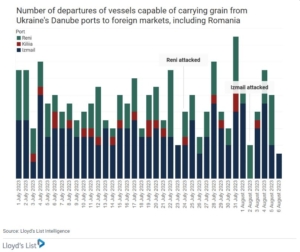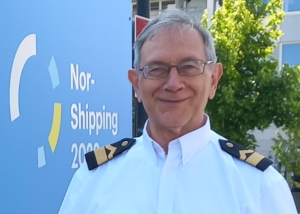Lloyd’s List: Russian ghost ships transporting oil and grain bypass sanctions

 By Marek Grzybowski
By Marek Grzybowski
Russian ships continue to export grain and oil using the technique of disabling the identification systems. The smuggling technique is very simple. Ships loaded in Russian ports are reaching friendly ports with cargoes, a joint investigation by Lloyd’s List, Bellingcat and Scripps News has shown. Greek shipowners transport Russian oil and products using legal loopholes.
Using satellite information along with AIS tracking data, a team of Lloyd’s List Intelligence experts monitored the voyage of the Russian bulk carrier M/S Mikhail Nenashev (IMO: 9515539) and has evidence of widespread sanctions circumvention by ship operators. Little is said here about buyers, forwarders, sea agents. A little, but enigmatic about financing and insurance institutions.
Course to the Arabian Peninsula ports
Since the beginning of the invasion of Ukraine, Russian ships have been secretly transporting grain from Crimea to Mediterranean, Arab, African and Asian ports. Mikhail Nenashev is one of those ships that demonstrates how to evade sanctions and direct cargo directly to Iran.
“The full investigation also revealed that at least 10 ships that secretly visited Sevastopol were loading grain,” the Lloyd’s List Intelligence team said, noting that “AIS tracking data and previous media investigations suggest these ships were likely bound for Syria and Turkey in the first year of the invasion.
Disabling AIS
An analysis of satellite photos and AIS data from Lloyd’s List Intelligence shows that STS transfers in the Kerch Strait have increased significantly and have expanded on an unprecedented scale since the start of the Russian invasion.
Satellite information taken in 2023 shows that Russian ships also export grain from other ports in Crimea and the occupied territories, such as Feodosia, Mariupol, Berdyansk and Kerch.
The basic ‘tactic’ for avoiding sanctions is AIS alone. In this way, there are interruptions in the monitoring of vessels, resulting from the switching off of the transponder of the automatic identification system of the vessel. Ghost ships navigate with AIS turned off to transit ports where cargo (grain or oil) transfers take place from ship to ship.
As examples, Mikhail Nenashev, Matrosh Shevchenko (IMO: 9574195), Matrosh Koshka (IMO: 9550137) and Matrosh Pozynich (IMO: 9573816) were photographed in Sevastopol with the AIS system turned off. Then ships in the Black Sea turned on AIS, and then sailed across the Bosphorus to the Aegean Sea.
More Photos: Bellingcat Investigation Team
STS and “flag hopping” operations
STS operations usually take place in international waters or in friendly ports, anchorages or bays. Flag hopping, or as Bellingcat calls it, is commonly used. The “proven” action of changing the ship’s register is used many years ago. Added to this are changes in ownership, notes Bridget Diakun, an analyst at Lloyd’s List in London.
“Changes of owner and operator that change every month” is repetitive, says Michelle Wiese Bockmann, senior analyst and columnist at Lloyd’s List Intelligence, dealing with the transport of strategic raw materials.
Some ships are past their heyday and are considered dangerous, such as M/S Pablo, a 27-year-old tanker registered in Gabon. The ship was damaged off the coast of Malaysia in May. According to Le Monde, the ship was likely carrying sanctioned Iranian oil and had probably just delivered Russian oil to a Chinese port before the accident.
Bockmann believes that nearly 12% of the global shipping market is currently served by ghost ships and is exploiting regulatory loopholes.
“If you want to hide in shipping [sanctioned goods – MG], it’s very, very easy,” says Bockmann, who has been following the situation in the sea trade of strategic cargo since the beginning of Russia’s invasion of Ukraine.
Products flow in a wide stream
It turns out that it is not Russian operators but Greek shipowners that play a decisive role in the Russian oil trade, and the fleet of Greek tankers is more important for Russian trade in petroleum products than other operators.
“Greek operators have the largest share of the fleet dealing with the Russian CPP (clean petroleum product) trade. The fleet operated by Greece carrying Russian CPPs is about 4 times larger than the next largest fleet [carrying oil and refined products – MG],” according to Melton.
Since May, the volumes of oil carried by Greek-operated ships have been steadily declining due to lower oil exports from Russia. On the other hand, for all Russian CPP exports (excluding LPG and chemicals), the volume collected by Greek operators has remained stable, with a monthly share of around 30% since May. Tanker operators from Greece have not withdrawn from trading with Russia, as the volume of refined products exported from Russia remains at a high level. And it’s not because of the low prices.
Pecunia non olet
The prices of refined products have not yet surpassed the high levels of a year ago and are lower by about 7% to 12%, according to the latest report by Banchero Costa. Cereal prices, on the other hand, are lower by about 25%. And the demand for bulk carriers and oil and gas tankers remains high.
The practice of circumventing the sanctions would not be possible if there were no buyers and all the logistics supporting grain, crude oil and refinery product transport operations. But buyers, forwarders, sea agents are not mentioned at all. And it is known that the headquarters of many of them are located in Europe. There is enigmatic information about financing and insurance institutions securing trade with Russia. And so they all form a chain of war earners. The Romans had a saying that is worth remembering before ineffective sanctions are introduced.
